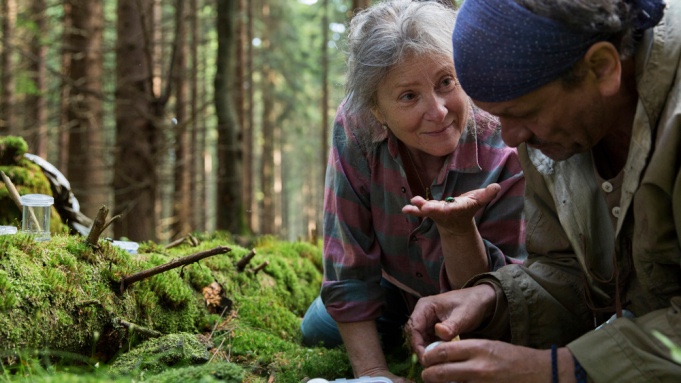SPOOR (Pokot)
Samuel Goldwyn Films
Reviewed for Shockya.com & BigAppleReviews.net linked from Rotten Tomatoes by: Harvey Karten
Director: Agnieszka Holland
Writer: Olga Tokarczuk, Agnieszka Holland, adapted from Olga Takorczuk’s novel
Cast: Agnieszka Mandat, Wiktor Zborowski, Miroslav Krobot, Jakub Gierszal, Patricia Volny, Tomasz Kot
Screened at: Critics’ link, NYC, 1/6/21
Opens: January 22, 2021

The difference between a B-movie crime story/TV episode like NCIS and an art movie that deserves greater concentration, is that the crimes, be they murder, robbery, rape, kidnap, and arson, should be entertaining thrillers, while the more intellectual dramas use the crimes as stepping-stones to the development of characters. “Spoor”is a good example of the latter. The title refers to the scent, droppings, even the trails trodden by animals. Animals, specifically dogs, boars, and antelopes, each have their brief starring roles, quite necessary to the development of plot. Since this is a film by the Polish director Agnieszka Holland, you would expect the story to be similar to that of her other contributions, such as her 2011 film “In Darkness” about one man’s rescue of Jews in the German-occupied city of Lvov. “Spoor” is more about the intended rescue of animals which are shot for fun, each month a different creature made legal to kill, in a small, southwest Polish town near the Czech border.
Holland, who studied filmmaking in Prague, focuses primary attention on Duszejko, an elderly woman who is the town’s only, animals rights advocate. Her personality might convince some diners that vegetarians and spokespersons for the four-legged are eccentric at least, crazy at most. Duszejko (Agnieska Mandat), a woman who objects vigorously to being called Janina though we do not find out why, is a part-time teacher in the local school whose 8-year-old kids love her, even hugging as you’d expect a dog to hug its human partner. She has studied astrology for years—not in itself eccentric, since even former first lady Nancy Reagan was a fan of the pseudoscience as well. When she protests against town laws that allow hunting, she undercuts her points with the police by screaming. The police have other concerns on their minds when bloodied bodies turn up in the snow, the film audience presuming that the wolf-hugger is the perp.
Though photographers Jolanta Dylewskh and Rafal Paradowski’s lenses are on Duszejko throughout, there are an abundance of secondary characters ranging from the wolves, boars, deer, foxes and even insects to people who enter in and exit from the scenes regularly. Among the folks introduced in this hayseed village are the priest, a man she should not have bothered to confide in, given that he considers equating dogs with people (my dogs are my daughters, insists Duszejko) with blasphemy since God gave us dominion over them and besides, animals do not have souls and therefore cannot be candidate for salvation. She has a brief affair with Boros (Miroslav Krobot), a wandering professor of her own age, an entomologist who advises her about how dead bodies can attract certain types of beetles.
Of the side roles, the most meaty, so to speak, is that of young Dyzio (Jakub Gierszal) who works for the police setting up and instructing them in how computers can help and who fears that he will lose his job because he has seizures. He will obviously team up with Dobra Nowina (Patricia Volny),the only twenty-something female in town.
Some of the material is rambling that would not be hurt by more attention from Pavel Hrdlika, its editor, but supplemented by more activity form the forest creatures that sometimes run quickly through the snow, and other times, as with deer that come over across the Czech border, and stand still, too dumb to be unafraid of humans.
Don’t expect too much blood, though one animal, apparently really gunned down by a hunter, is hugged and prayed over by Duszeklo. The principal reason for seeing this movie is the performance of Kraków-born Mandat, 64-years old when this was filmed, well known in her own country for roles in a host of TV dramas. Otherwise there are too many moments of tedium in this overlong, 128-minute offering, but enlivened by many of the secondary characters coming across not as salt-of-the-earth just-folks but mostly as fierce adversaries of animals, from the priest to the types you probably found climbing the walls of the capitol to protest a fair U.S. election.
In Polish with English subtitles.
128 minutes. © 2021 by Harvey Karten, Member, New York Film Critics Online
Story – B-
Acting – B+
Technical – B+
Overall – B
